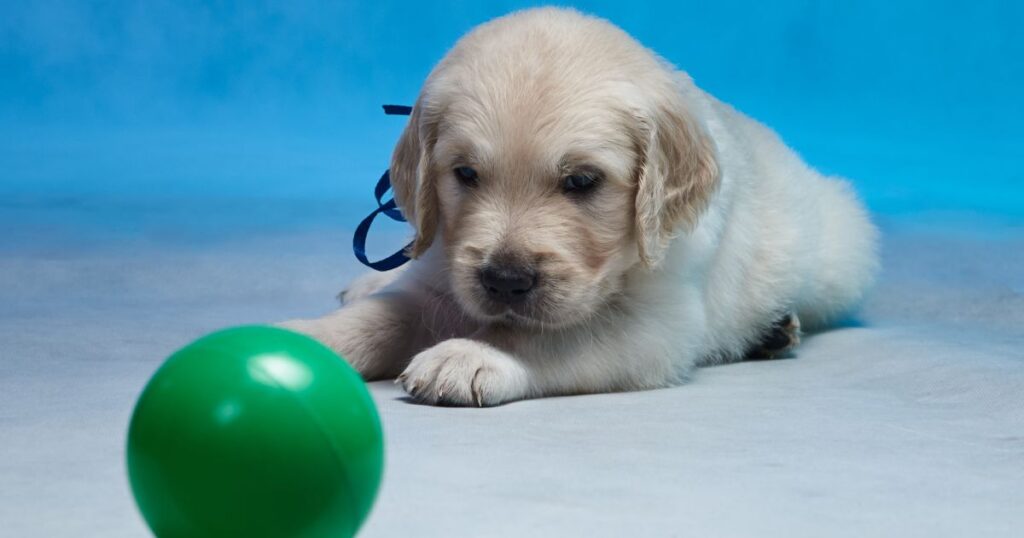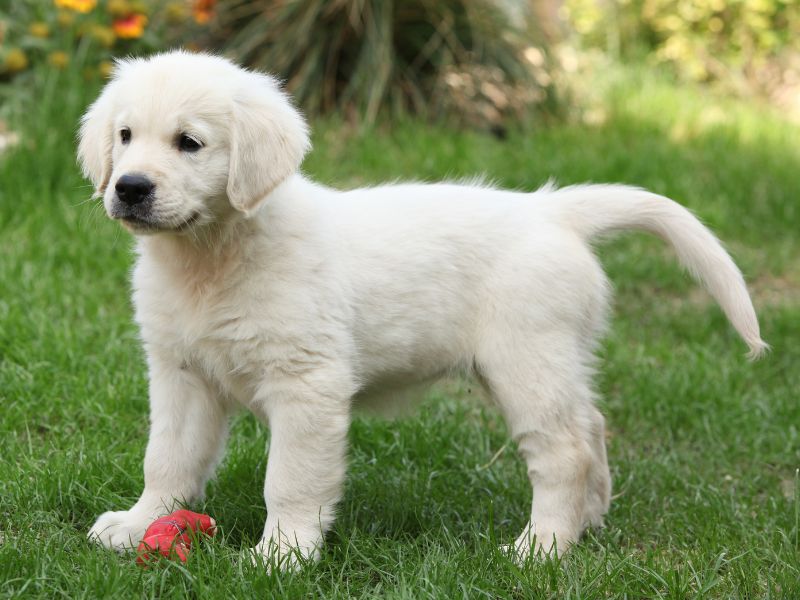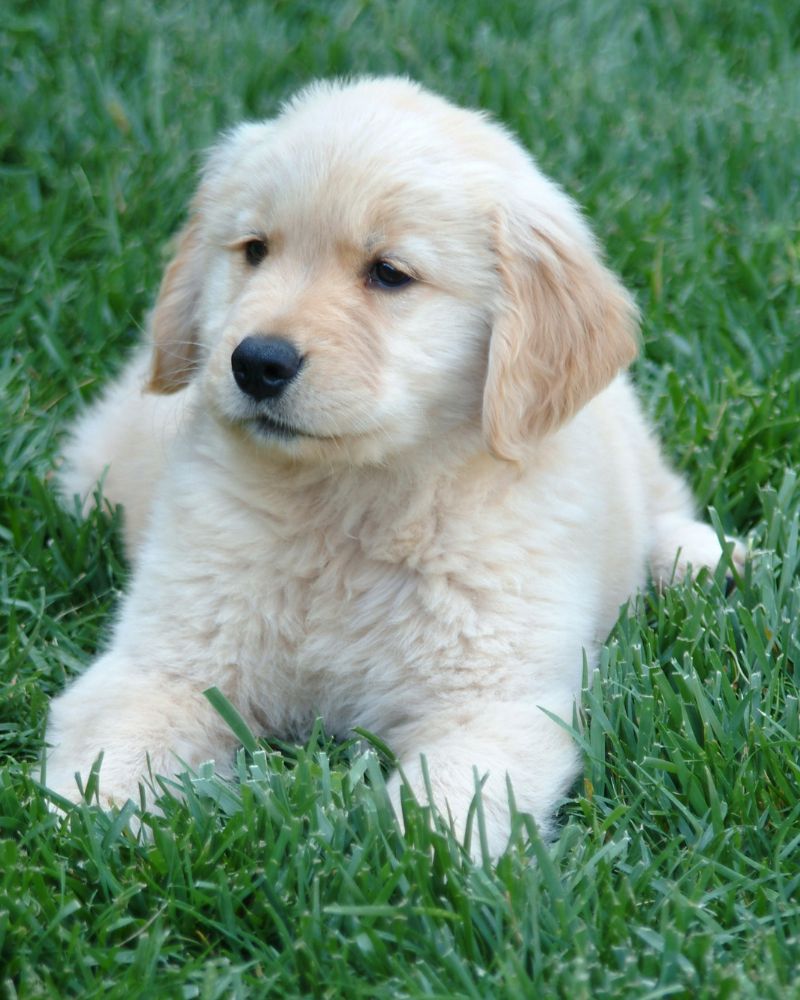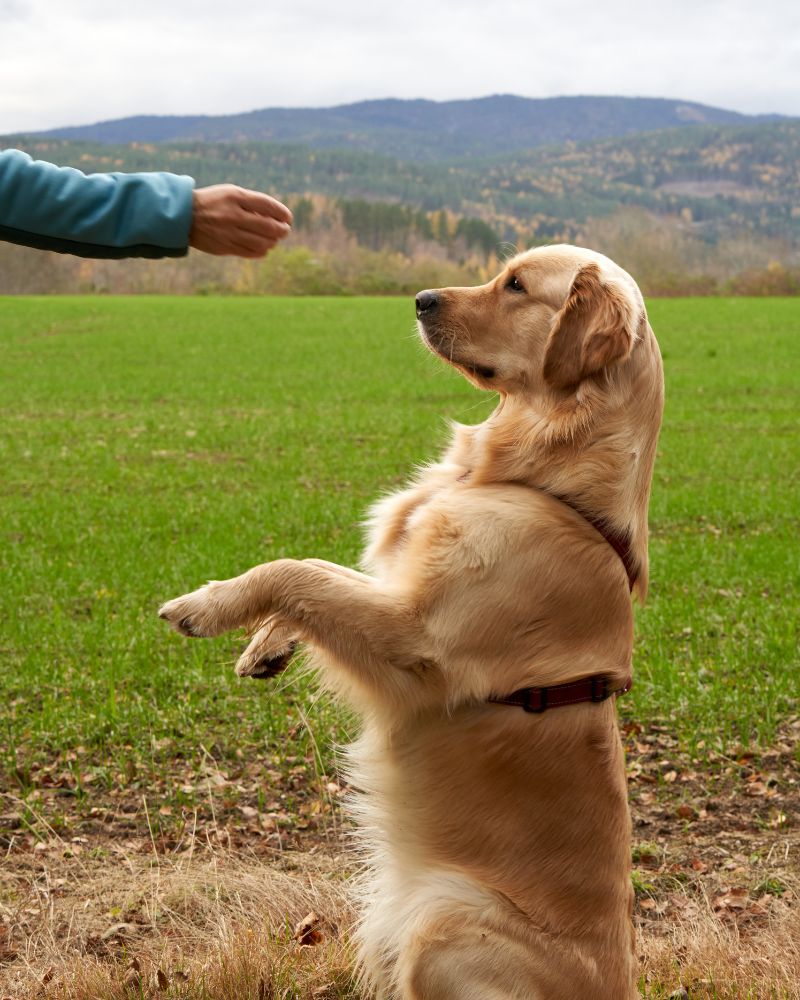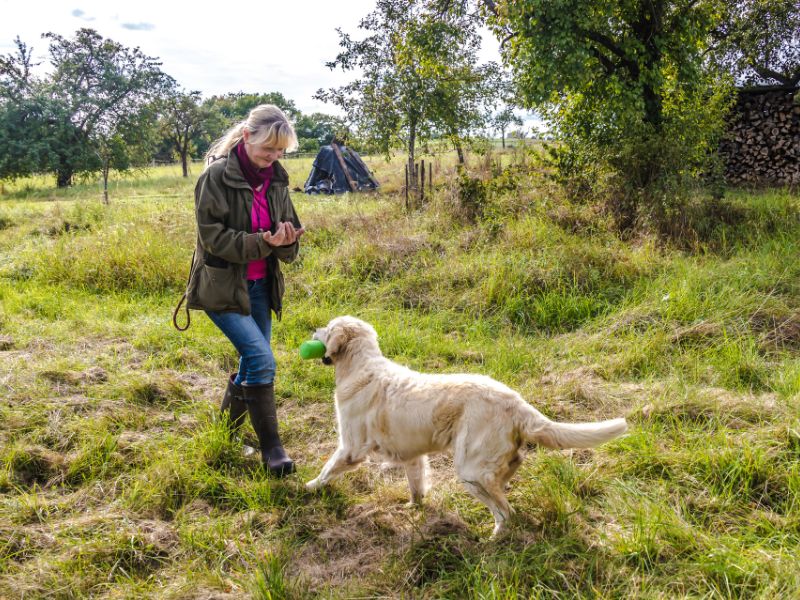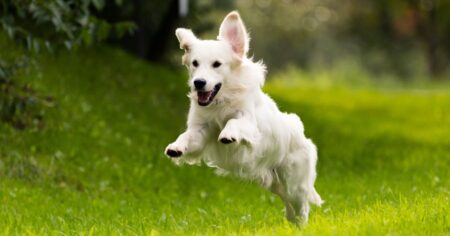Golden Retrievers are a popular breed of dog, known for their friendly demeanor and intelligence. However, like any other puppy, Golden Retrievers require proper training to become well-behaved and obedient adults. Training a Golden Retriever puppy can seem like a daunting task, but with the right approach and techniques, it can be a rewarding experience for both the puppy and the owner.
One of the most important aspects of training a Golden Retriever puppy is to start early. Puppies have a critical socialization period between 3 and 14 weeks of age, during which they are most receptive to learning and forming positive associations with people, other dogs, and their environment. Puppy kindergarten and basic obedience classes can provide an excellent opportunity for socialization and early training.
Another crucial aspect of training a Golden Retriever puppy is to use positive reinforcement techniques. Rewarding good behavior with treats, praise, and playtime can help establish a strong bond between the puppy and the owner and encourage the puppy to repeat desirable behaviors. Consistency and patience are also key factors in successful puppy training. With time and effort, any Golden Retriever puppy can become a well-behaved and beloved companion.
Training Your Golden Retriever Puppy
Training a Golden Retriever puppy is an essential part of ensuring that they grow up to be well-behaved and obedient dogs. While Goldens are known for being friendly and easy to train, it is still important to start their training early on to establish good habits and prevent bad ones from forming.
One of the first things to focus on when training a Golden Retriever puppy is basic obedience. This includes commands such as sit, stay, come, and leave it. Puppy Kindergarten and group-based training classes are great options for teaching these basic commands. It is important to reward good behavior and be consistent with training to reinforce positive habits.
Potty training is another crucial aspect of training a Golden Retriever puppy. Consistency is key when it comes to potty training, and it is important to establish a routine and take the puppy outside frequently, especially after meals and naps. Crate training can also be helpful for potty training and preventing destructive behavior when the puppy is left alone.
Socialization is also an important part of training a Golden Retriever puppy. Introducing the puppy to new people, animals, and environments can help prevent fear and aggression later on. Exposing the puppy to different sights, sounds, and smells can also help prevent anxiety and nervousness.
Overall, training a Golden Retriever puppy requires patience, consistency, and positive reinforcement. With proper training, a Golden Retriever puppy can grow up to be a well-behaved and obedient companion.
Why Should You Train Your Golden Retriever Puppy?
Training your Golden Retriever puppy is essential for their overall well-being and your peace of mind. Here are some reasons why you should train your Golden Retriever puppy:
- Safety: Untrained puppies can be a danger to themselves and others. Training your puppy to obey basic commands such as sit, stay, and come can prevent them from running into traffic or getting into dangerous situations.
- Socialization: Socializing your puppy can help them develop into a well-adjusted and friendly adult dog. Training your puppy to interact with other dogs and humans can prevent them from developing fear or aggression towards strangers.
- Bonding: Training your puppy can be a great bonding experience for both you and your furry friend. Spending time together and working on commands can strengthen your relationship and build trust.
- Good behavior: A well-trained puppy is a joy to be around. Training your puppy to behave well can prevent destructive behaviors such as chewing, digging, and barking excessively.
- Fun activities: Training your Golden Retriever puppy can open up a world of fun activities such as hiking, swimming, and hunting. A well-trained puppy can enjoy these activities safely and responsibly.
In summary, training your Golden Retriever puppy is essential for their safety, socialization, bonding, good behavior, and enjoyment of life. It is a worthwhile investment of time and effort that will pay off in the long run.
Are Golden Retriever Puppies Easy To Train?
Golden Retrievers are known for their friendly and sociable nature, making them a popular choice for families and first-time dog owners. When it comes to training, Golden Retriever puppies are generally easy to train due to their intelligence and eagerness to please their owners. However, like any other breed, training a Golden Retriever puppy requires patience, consistency, and positive reinforcement.
One of the reasons why Golden Retriever puppies are easy to train is their natural intelligence. They are quick learners and can easily pick up new commands and tricks. Additionally, Golden Retrievers are known for their eagerness to please their owners, making them highly motivated during training sessions.
Another factor that makes Golden Retriever puppies easy to train is their friendly and sociable nature. They love interacting with people and other dogs, which makes socialization and obedience training a breeze. However, it is important to start training early and consistently to prevent any unwanted behaviors from developing.
Overall, Golden Retriever puppies are generally easy to train with the right approach and consistency. By providing positive reinforcement, socialization, and consistent training, owners can help their Golden Retriever puppies become well-behaved and obedient companions.
Why Golden Retriever Puppies Are Hard To Train
Golden Retriever puppies are adorable, playful, and energetic, but they can also be challenging to train. Here are a few reasons why Golden Retriever puppies can be hard to train:
- Short Attention Span: Golden Retriever puppies have a short attention span, which can make it difficult to keep them focused during training sessions. They may get easily distracted by their surroundings, other people, or other dogs.
- Mouthiness: Golden Retriever puppies tend to be mouthy, which means they like to chew on things. This behavior can be exacerbated by teething, which can make them even more prone to chewing. This can make it difficult to train them not to chew on things they shouldn’t.
- Excess Energy: Golden Retrievers are a breed that requires a lot of exercise on a daily basis. If they do not get enough exercise, they can have a lot of excess energy, which can make it difficult to keep their focus during training sessions.
- Stubbornness: Golden Retrievers can be stubborn at times, which can make them resistant to training. They may not always want to do what their owner wants them to do, which can make training a challenge.
Despite these challenges, Golden Retriever puppies are not impossible to train. With patience, consistency, and positive reinforcement, owners can train their Golden Retriever puppies to be well-behaved and obedient companions.
When Should You Start Training Your Golden Retriever Puppy?
Training a Golden Retriever puppy is a crucial part of their development. It is always best to start training your Golden Retriever puppy as soon as you bring them home, which is usually between eight and ten weeks. Starting training early will help your puppy develop good habits and prevent bad ones from forming.
Before starting training, it is important to understand that puppies have a short attention span and get tired quickly. Therefore, training sessions should be kept short and fun. It is recommended to start with simple things like some basic obedience commands, working through potty training, and beginning crate training.
It is also important to note that training a Golden Retriever puppy is a gradual process that takes time and patience. Puppy training should be done in a positive and encouraging manner to build a strong bond between the puppy and the owner.
Overall, it is best to start training your Golden Retriever puppy as soon as possible to ensure they develop good habits and become well-behaved adult dogs.
Positive Reinforcement
Positive reinforcement is a highly effective training method for Golden Retriever puppies. This technique involves rewarding desired behaviors with treats, praise, or toys to encourage the puppy to repeat the behavior. It is important to use positive reinforcement consistently and immediately after the behavior occurs to reinforce the association between the behavior and the reward.
When using positive reinforcement, it is important to keep training sessions short and frequent. This helps to keep the puppy engaged and motivated. Additionally, it is important to use a variety of rewards to keep the puppy interested and motivated. This can include treats, praise, and toys.
It is also important to avoid using punishment or negative reinforcement when training a Golden Retriever puppy. This can lead to fear and anxiety, which can make training more difficult. Instead, focus on rewarding desired behaviors and ignoring unwanted behaviors.
Overall, positive reinforcement is a highly effective training method for Golden Retriever puppies. By using this technique consistently and frequently, owners can help their puppies learn new behaviors quickly and effectively.
Marker Training
Marker training is a powerful tool for training a Golden Retriever puppy. This technique involves using a sound or a visual cue, such as a clicker or a word, to mark the exact moment when the puppy performs the desired behavior. The marker is then followed by a reward, such as a treat or praise. This helps the puppy understand which behavior is being rewarded and reinforces that behavior.
Marker training is particularly effective for teaching complex behaviors, such as obedience commands and tricks. It also helps to build a strong bond between the puppy and the owner, as the puppy learns to associate the marker with positive reinforcement from the owner.
To start marker training, the owner should first choose a marker, such as a clicker or a verbal cue like “yes.” The owner should then train the puppy to associate the marker with a reward by repeatedly marking the desired behavior and immediately following with a reward.
Once the puppy understands the association between the marker and the reward, the owner can begin using the marker to shape more complex behaviors. For example, if the owner wants to teach the puppy to sit, they can use the marker to mark the exact moment when the puppy’s rear end touches the ground and follow with a reward.
Overall, marker training is a highly effective and positive training technique that can help owners train their Golden Retriever puppy quickly and efficiently. By using a marker to reinforce positive behaviors, owners can build a strong bond with their puppy and create a happy, well-behaved companion for years to come.
Techniques
Training a golden retriever puppy can be an enjoyable experience for both the owner and the puppy. Here are some techniques that can help make the training process easier:
Positive Reinforcement
Positive reinforcement is a training technique that involves rewarding good behavior. This technique is effective because it encourages the puppy to repeat the behavior. Treats, praise, and playtime are some examples of positive reinforcement. Consistency is key when using this technique.
Clicker Training
Clicker training is a type of positive reinforcement training that uses a clicker to mark the desired behavior. The clicker is a small device that makes a clicking sound when pressed. The puppy learns to associate the sound of the clicker with the reward. Clicker training can be used for basic obedience commands such as sit, stay, and come.
Leash Training
Leash training is an essential part of puppy training. It involves teaching the puppy to walk on a leash without pulling or dragging. A good way to start leash training is to let the puppy wear the leash around the house and get used to the feel of it. Once the puppy is comfortable with the leash, take short walks around the neighborhood, rewarding good behavior with treats and praise.
Socialization
Socialization is the process of introducing the puppy to new people, animals, and environments. It is important to socialize the puppy at an early age to prevent behavioral problems in the future. Puppy socialization classes and playdates with other puppies are great ways to socialize a golden retriever puppy.
Consistency
Consistency is crucial when it comes to training a golden retriever puppy. The puppy needs to know what is expected of him and what behaviors are acceptable. It is important to use the same commands and techniques consistently to avoid confusion. Consistency also means setting aside time every day for training and practicing good behavior.
Teaching Your Dog To Obey In Every Situation (Even While Distracted)
Teaching your golden retriever puppy to obey commands in every situation is essential for their safety and your peace of mind. However, it can be challenging to get your puppy to listen to you when there are distractions around. Here are some tips to help train your puppy to obey you, even when they are distracted.
Start With Basic Commands
Before you can expect your puppy to obey you in every situation, you need to start with basic commands such as sit, stay, come, and heel. Once your puppy has mastered these commands, you can move on to more advanced training.
Use Positive Reinforcement
Positive reinforcement is a powerful tool when it comes to training your puppy. Reward your puppy with treats, praise, and affection when they obey your commands. This will encourage them to repeat the behavior in the future.
Train In Different Environments
Training your puppy in different environments will help them learn to obey you in every situation. Start training in a quiet, distraction-free environment and gradually increase the level of distraction as your puppy becomes more skilled.
Use Distractions To Your Advantage
Rather than avoiding distractions, use them to your advantage. For example, if your puppy is easily distracted by other dogs, use this as an opportunity to teach them to focus on you. Start by asking your puppy to sit and stay while other dogs are around. Reward them with treats and praise when they obey your commands.
Be Patient And Consistent
Training your puppy to obey in every situation takes time and patience. Be consistent in your training and use positive reinforcement to encourage good behavior. With time and practice, your puppy will learn to obey you even when there are distractions around.
Remember, training your golden retriever puppy to obey in every situation is an ongoing process. Be patient, consistent, and use positive reinforcement to encourage good behavior. With time and practice, your puppy will become a well-behaved and obedient companion.
How Long & How Often To Train Your Golden Retriever Puppy
Training a Golden Retriever puppy requires patience, consistency, and dedication. It is always best to start training your puppy as soon as you bring them home, usually between eight and ten weeks. However, it is important to remember that puppies have a short attention span, so training sessions should be kept short and frequent.
According to Loyal Goldens, it takes 18-24 months to fully train a Golden Retriever puppy, based on their stages of growth and maturity. At 7-8 weeks, you can begin training your Golden to socialize, not bite, and relieve themselves outside. By six months, your Golden Retriever puppy should be learning basic commands, like “sit” and “stay.”
Training sessions should be no longer than 15 minutes, two to three times a day. Overtraining can lead to exhaustion and frustration for both you and your puppy. It is important to keep training sessions fun and engaging, with plenty of positive reinforcement.
Consistency is key when training your Golden Retriever puppy. Use the same commands and rewards every time, and make sure everyone in the household is on the same page. It is also important to be patient and understanding. Puppies make mistakes, and it is up to you to guide them in the right direction.
In summary, training a Golden Retriever puppy takes time and effort. Short, frequent training sessions are best, with plenty of positive reinforcement and consistency. With patience and dedication, your Golden Retriever puppy will become a well-behaved and obedient companion.
Getting Professional Help
Sometimes, training a Golden Retriever puppy can be a challenging task, especially for first-time dog owners. In such cases, it is advisable to seek professional help. A professional dog trainer can help you train your Golden Retriever puppy effectively and efficiently.
Professional dog trainers have the knowledge and experience to train dogs of all ages and breeds. They can help you teach your Golden Retriever puppy basic obedience commands, such as sit, stay, come, and heel. They can also help you with more advanced training, such as agility training or therapy dog training.
When choosing a professional dog trainer, it is important to do your research. Look for a trainer who has experience training Golden Retrievers and who uses positive reinforcement techniques. Positive reinforcement techniques involve rewarding your puppy for good behavior rather than punishing them for bad behavior.
Professional dog trainers can be found through local pet stores, veterinary clinics, or online directories. You can also ask for recommendations from other dog owners or breeders.
Overall, getting professional help can be a great way to ensure that your Golden Retriever puppy receives the best possible training. With the help of a professional trainer, you can create a strong bond with your puppy and enjoy a happy and well-behaved companion for years to come.
Common Golden Retriever Puppy Training Mistakes
Training a Golden Retriever puppy can be a challenging task, especially for first-time owners. While there are many effective training methods, there are also common mistakes that can hinder the training process. Here are some of the most common golden retriever puppy training mistakes to avoid:
Inconsistent Training
One of the most common mistakes new puppy owners make is not being consistent with their training. Golden Retrievers are intelligent dogs and can quickly learn the desired behavior, but they need consistent reinforcement. Inconsistent training can lead to confusion and frustration for both the owner and the puppy. It is essential to establish a consistent training routine and stick to it.
Using Punishment
Punishing a puppy for unwanted behavior can be counterproductive. It can lead to fear and anxiety, making the puppy less likely to learn the desired behavior. Positive reinforcement is a more effective training method. Rewarding the puppy for good behavior will encourage them to repeat it.
Overwhelming the Puppy
Golden Retriever puppies have a short attention span and can easily become overwhelmed. It is important to keep training sessions short and engaging. Overwhelming the puppy with too much information can lead to frustration and a lack of progress.
Neglecting Socialization
Socialization is a crucial aspect of puppy training. Golden Retrievers are social dogs and need to be exposed to different people, animals, and environments to develop good social skills. Neglecting socialization can lead to behavior problems later in life.
Neglecting Exercise
Golden Retrievers are active dogs and need plenty of exercise to stay healthy and happy. Neglecting exercise can lead to behavior problems such as excessive barking, chewing, and digging. It is essential to provide the puppy with regular exercise to burn off energy and prevent behavior problems.
By avoiding these common golden retriever puppy training mistakes, owners can establish a strong bond with their puppy and ensure a successful training process.
Obedience Training & Life Skills
Obedience training is an essential part of raising a well-behaved and happy Golden Retriever puppy. It is important to start training your puppy as early as possible to establish good habits and prevent unwanted behavior. The AKC recommends starting with group-based Puppy Kindergarten and basic obedience training 1. This will help your puppy learn socialization skills and basic commands such as sit, stay, come, drop it, and leave it 2.
Using food treats during training is highly effective 3. You can use food treats as lures to get them into a position and as a reward for doing so afterwards. This is extremely effective. It is important to avoid using physical punishment or negative reinforcement during training as it can damage the bond between you and your puppy 1.
In addition to obedience training, teaching your Golden Retriever puppy life skills is also important. This includes potty training, crate training, not jumping on people, how to walk on a leash, not to bite people, and not to chew up the house 2. Consistency is key when teaching life skills. It is important to establish a routine and stick to it. Praise and reward your puppy when they exhibit good behavior to reinforce positive habits 4.
Overall, obedience training and life skills are essential for raising a well-behaved and happy Golden Retriever puppy. By starting early and using positive reinforcement, you can establish good habits and prevent unwanted behavior.
Footnotes
Conclusion
Training a Golden Retriever puppy can be a fun and rewarding experience for both the owner and the pup. It requires patience, consistency, and positive reinforcement. By following the tips and guidelines provided in this article, owners can ensure that their puppy grows up to be a well-behaved and obedient dog.
One of the most important things to remember when training a Golden Retriever puppy is to start early. Puppies are like sponges, and they absorb information quickly. By starting training as early as possible, owners can establish good habits and prevent bad ones from forming.
Another key to successful Golden Retriever puppy training is to use positive reinforcement. This means rewarding good behavior with treats, praise, and affection. It is important to avoid punishment and negative reinforcement, as this can damage the relationship between the owner and the puppy.
Consistency is also important when training a Golden Retriever puppy. Owners should establish clear rules and boundaries, and stick to them. This will help the puppy understand what is expected of him and prevent confusion.
Overall, training a Golden Retriever puppy can be a fun and rewarding experience. With patience, consistency, and positive reinforcement, owners can ensure that their puppy grows up to be a well-behaved and obedient dog.

